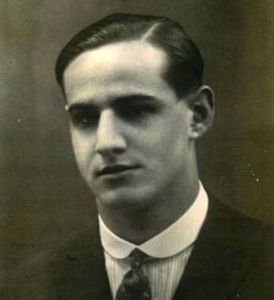Poet
 Luigi (Gigetto) Asquasciati, born in Sanremo on 2 February 1905, who dedicated a large part of his poetic work to Sanremo and its hinterland.
Luigi (Gigetto) Asquasciati, born in Sanremo on 2 February 1905, who dedicated a large part of his poetic work to Sanremo and its hinterland.
Son of the banker Francesco and Maria Accame and great-grandson of the Mayor Bartolomeo Asquasciati, he studied at Cassini High School and graduated in Literature at the University of Genoa.
He could be defined as a Ligurian in body and soul, yet he always isolated himself both in terms of attendance and lyrical approach from the great family of Ligurian poets of his time (Montale, Sbarbaro, Barile). Nevertheless he left a whole body of poetry of high value, among which will certainly be remembered collections such as: "Chiara laughs", "Gli angioli di Melozzo da Forlì", Calendari la frana.
Poet above all, under the pseudonym of Renzo Laurano, but in general a man of culture and protagonist of the social life of the city.
Awarded, internationally known, he was the protagonist of the great season of his town between the two wars. A war hero, a character of great worldly dimension, an old-fashioned gentleman and also interested in innovative phenomena, such as songwriting.
He was a teacher, passionate traveller and translator from Provence.
A soldier in the second war was given for dead on the Russian front and, therefore, commemorated and solemnly mourned about forty years before his actual death. He was a complex and worthy of being remembered.
Of ancient Sanremasca family and who always lived in Liguria, Renzo Laurano remains, as a poet, of difficult position within that "Ligurian line" which is customary to recognize in a rough, essential, touching existentialism.
"In my poem, which is so troubled and upset by my "Liguria sickness" or "love of Liguria", the sea-sea, that "sea in person" I know very well".
Laurano was therefore interested in bringing out a vision that put at the centre of the whole sea horizon, this being said, it is also obligatory to recall Laurano's interest in ancient Trobadoric poetry and to underline, among other things, the continuity of the Trobadoric passion with his personal experience of poetry and that support for the world of song that brought Laurano to the Sanremo festivities and the creation of the "Club Tenco".
Luigi Asquasciati was born in Sanremo della Belle Epoque, into a family of high social standing. The young "Gigetto" grew up without any problems, studied the subjects most suited to his sensibility and had a lot of fun in an international city full of occasions, a real paradise of fun.
Even the affirmation of Fascism is experienced by him in relation to the vitalistic dimension of self-assertion rather than in the political context.
He graduated in Law in 1928 and then, following his literary instinct, in Literature in 1934, again in Genoa.
Poetry now reflects his inner world through the many inspirations dictated by life and by friendly and affective encounters. In 1934 the text "Chiara ride" was awarded at the International Art Biennale of Venice.
In the meantime the game of disguise had involved the same identity, which changed from the difficult "Luigi Asquasciati" to the musical and poetic "Renzo Laurano", the pseudonym of a life.
In those years the correspondence with many exponents of the Italian literary world became very dense. The exchange of letters with Eugenio Montale, Giorgio Caproni, Salvatore Quasimodo remained famous.
He took part in the Second World War in the Infantry. The uniform is for him a source of patriotic pride and a search for adventure. He left for Russia, not a volunteer. He will be believed to be lost and fallen, but he manages to return.
He will be a teacher for a long time after the war. And he will continue to write: a few collections of poetry, much meditated on, many articles, reviews, translations of beloved Provencal troubadours, letters. And love, love for the many inspirers of his poetry, his feelings, for his city and friends with whom he shared a life full of transformations, twists and turns and adventures, including literary ones.
Renzo Laurano was also involved in music. Indeed, music and poetry. In other words, texts, understood as poetry. This situation culminated in 1972 with the foundation of the "Club Tenco", created in the memory of the singer-songwriter: a group of friends, and also the moment of an intense debate on the function of the poet and music in the modern context, in which Laurano participated with impetus.
He died in Genoa on 16 May 1986 and with a bequest to the Municipality of Sanremo he left 4600 volumes, 7000 letters and 2500 literary magazines of the time to the Civic Library. At the same time he left the collection of family paintings and prints and Garibaldi's relics to the Civic Museum.
(taken from Rosso Venexiano)




